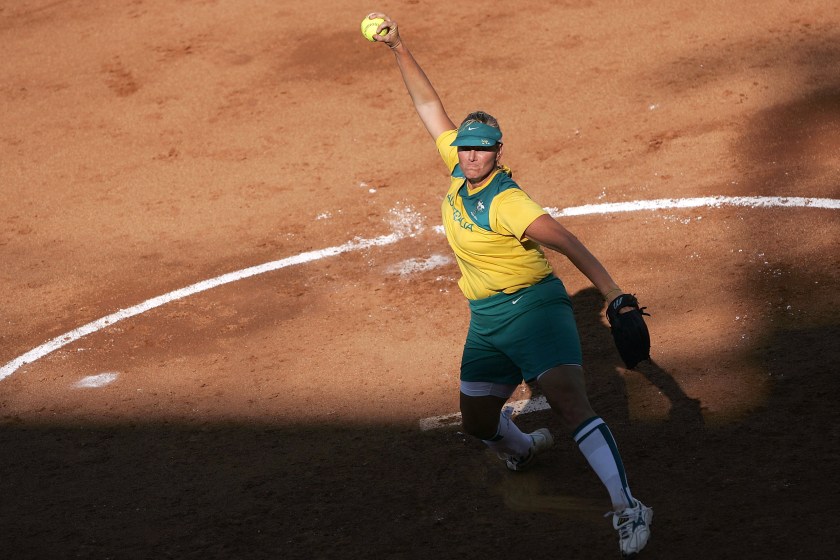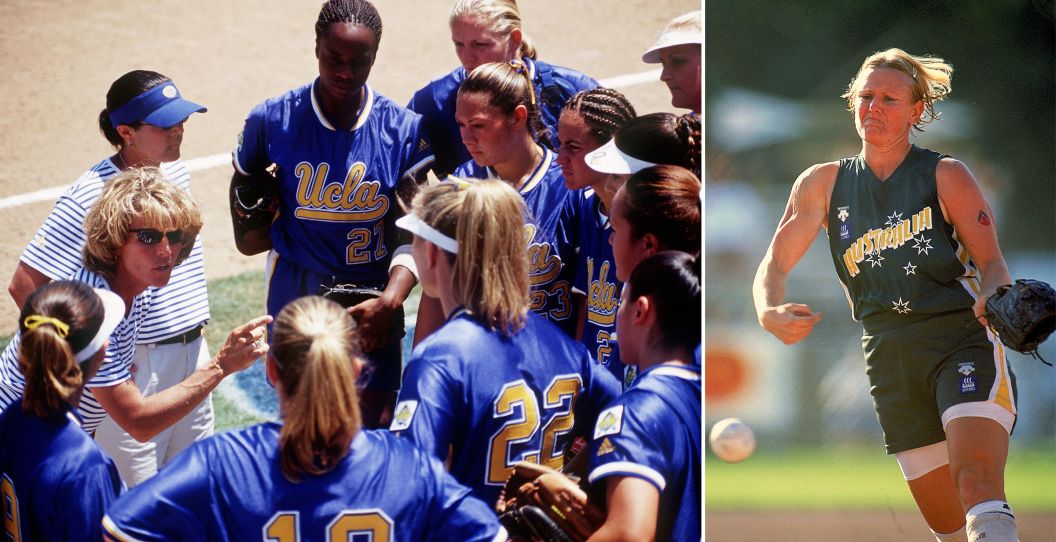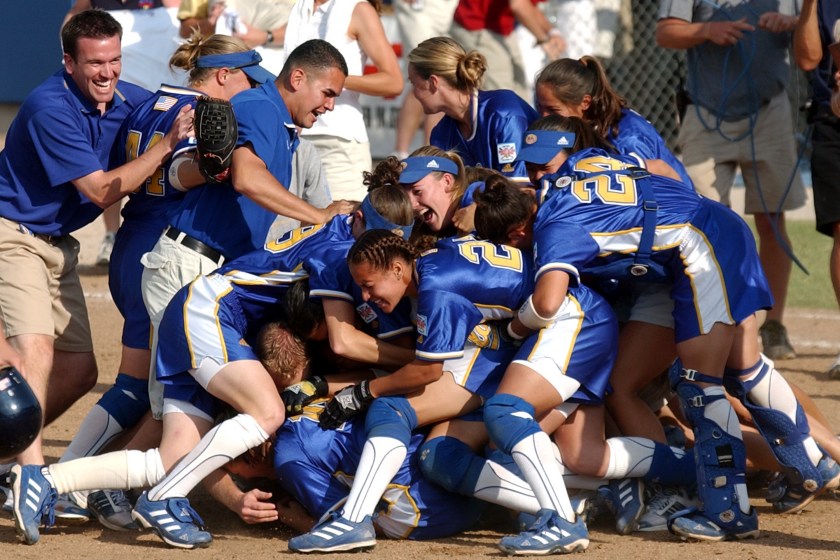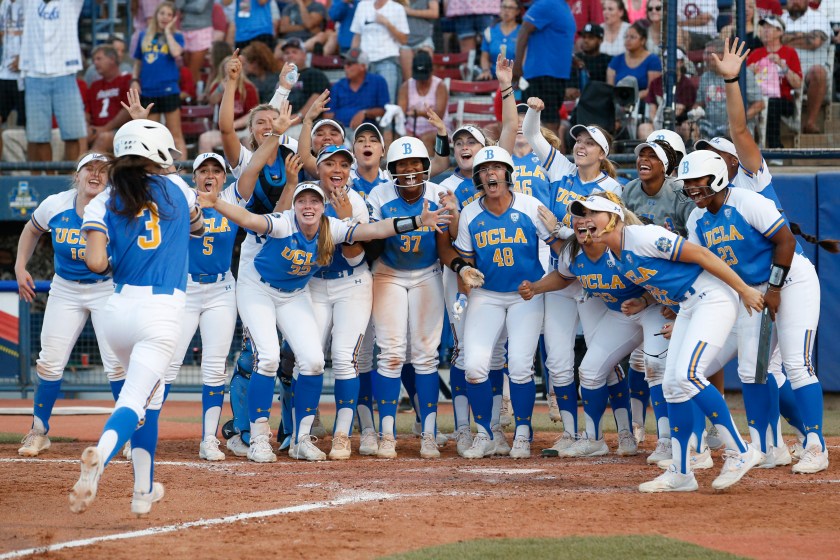She was only in school for 10 weeks.
Videos by FanBuzz
That's how long Tanya Harding — not to be confused with that Tonya Harding — was at UCLA. In those 10 weeks, the Australian ringer took three classes, won 17 games and captured one very tainted national championship.
Then, she left.
To this day, UCLA's 1995 national title is still the only softball national championship to ever be vacated by the NCAA. In a day and age where players are transferring left and right, a concept some softball legends feel is ruining the sport, this is the bizarre story of how the winningest program in softball had its eighth title taken away.
How UCLA Softball Forfeited the 1995 National Title
In 1997, it was announced to everyone's surprise that the UCLA softball team was to be stripped of its 1995 national championship and barred from postseason play, and that the entire school's program would be put on probation for the next three years, according to the Los Angeles Times.
The revenue sports generate for universities is massive, and it's why a lot of their budgets go toward improving and supporting athletes. However, one school took "supporting their athletes" a little too far by violating NCAA rules.
The NCAA's ruling came after it was revealed the school was unethically providing softball scholarships to players using soccer scholarships. This caused a violation in "institutional control, financial aid and ethical conduct" and gave the softball team a competitive advantage in its national championship, according to the Los Angeles Times.
Giving funds from another sport to softball players put the university over its allotted funds allowed. These rules are meant to help give universities a more even playing field when it comes to recruitment.
The players weren't identified, although one was suspected to be Australian pitcher Tanya Harding, who helped lead the team to the national title in 1995, according to the Los Angeles Times.
The school was put on probation, and the fallout included having its scholarship funds reduced for the following two years. The school was also at risk for infliction of the "death penalty" for any of its sports if it committed another infraction within five years.
The NCAA also had called for a senior associate director of athletics be removed from their position due to unethical conduct. Although the person wasn't named, Judith Holland, who was in that position, was transferred around the same time. Holland insisted Harding was eligible, which she was. Still, that doesn't mean the entire situation was ethical.
Unfortunately, the ruling would affect even the freshmen throughout their entire time playing for the school. University officials said they were going to be extremely careful moving forward to prevent another violation.
The NCAA's decision was a massive setback for the school and team, because it meant they could be less enticing for players to join due to both the scandal as well as the reduced funds. For many college athletes, their ability to get a scholarship can play a huge part in their decision to enroll at a school. UCLA is also known as being one of the pricier colleges, especially for out-of-state students.
But this ruling, while devastating to the team, wasn't the end for the school.
The Tanya Timeline

Tanya Harding pitches for Australia at the 2004 Olympic Games. (Photo by Robert Laberge/Getty Images)
As we just said, one suspected player was Tanya Harding. Harding was a 23-year-old member of the Australian national team who hailed from Queensland, Australia. She took a three-month leave from her job as a bank teller to fly to California. She was a terrific pitcher, going 17-1 with a 0.50 ERA and hitting .456 at the plate that season. She won the Women's College World Series MVP after going 4-0 and hitting .500.
The wacky part is that she joined the Bruins 20 games into their season. Here's what her timeline looked like as a Bruin.
- March 22, 1995: Harding arrives at UCLA.
- March 27, 1995: Harding makes her debut
- May 30, 1995: Harding pitches UCLA's national title win over Arizona. The Bruins won, 4-2. Harding is named WCWS MVP after going 4-0.
- June 1, 1995: Harding drops out of school and returns to Australia. She registers incomplete for her three classes.
What Harding didn't wasn't illegal, but unethical? Probably.
"What I did wasn't illegal," Harding told the Los Angeles Times in June 1995 . "I feel bad in a way because if I'd known it was going to cause this much trouble, I probably wouldn't have gone in the first place."
An NCAA spokeswoman at the time, Kathryn Reich, also told the LA Times that no rules were broken.
"It's one of those things you can't legislate," Reich said. "At some point, you have to trust the people to do the right thing and adhere to the spirit of the rules. When it's only one term, I'm not sure there is much you could do to ensure the athlete finishes the term."
Harding returned home a champion. She'd on to have an illustrious career with Australia's national team, including medaling in four consecutive Olympic Games from 1996-2008. Just last year, she was inducted into the Sport Australia Hall of Fame.
UCLA's Dynasty Didn't Crumble
Since the ruling, UCLA's softball team has won five national championships, most recently in 2019. This brings its total to 12 and makes it the team with the most national championships despite being currently ranked below Oklahoma, according to the NCAA.
This an extremely impressive feat considering the school was put at a slight disadvantage for recruitment in the years it was under probation.
Then there's the fact that then-UCLA head coach Sharron Backus retired a few months before the NCAA's decision, during the investigation. With a 847-167-3 record, she was a legend in the game.
The team's probation ended on Feb. 1, 2000. During that time, it was still able to win a national championship in 1999.
While I'm sure it was quite the shock for fans and players alike, the scandal apparently never slowed the team's momentum, as it continued to perform and surpass expectations. Once you hit rock bottom, I guess there really is no place to go except up. The fact that the team was able to win a championship so soon after being stripped from a previous title is truly a feat in itself.
UCLA's senior women's administrator, Betsy Stephenson, commented on the situation back in 1997.
"The university took a position that it needed to improve its institutional control from the very beginning," Stephenson told the Los Angeles Times. "In terms of repairing the damage that's been done, all I can say to you is that UCLA has a commitment to compliance."
Although UCLA's 2023 season was disappointingly cut short, I wouldn't bet against them in upcoming years, as it seems this team is not yet through winning national titles. The university was able to learn from its mistakes and produce outstanding athletes, one of which was Tom Brady's niece, Maya Brady, who was one of college softball's best players in 2023.
UCLA softball fans can still expect to reap the reward of their loyalty to the team in upcoming years. And I'm sure the players who were stripped of the national championship are relieved to see their alma mater continue to thrive and fight back.


